Danni Peng-Li,是中丹学院丹麦籍国际学生,2018年神经科学硕士专业毕业,以满分的优秀论文成绩获得中国科学院大学和丹麦奥胡斯大学的双硕士学位,现为中丹学院2019级博士研究生,该生科研能力强,硕士期间已发表SCI论文,博士仅一年已发表SCI核心期刊论文6篇。该生在校期间,积极组织参与社团活动,通晓丹麦语、汉语、英语,沟通能力极强,深受老师和同学的好评,并通过激烈的竞争,以其优秀的学术表现和个人素质,脱颖而出,被评为2020年国科大优秀国际学生!中国科学院大学现有国际学生近2000名,每年仅有40名国际学生可以获得优秀国际学生的称号,Danni Peng-Li作为中丹学院优秀的学生代表,获此殊荣,可喜可贺!我们特此邀请Danni Peng-Li就其在中丹的学习和生活经历,与大家分享,希望中丹学院不断涌现更多的优秀学子,为中丹学院争光,让国科大为你自豪!为中丹的科研教育的发展合作作出贡献。 (王昕)
丹方导师评语摘抄(详见附件):Danni has demonstrated excellent completing a double PhD degree at AU and UCAS. He has held two workshops within a half year. He has volunteered the events of "Aarhus Food Festival 2009" and has independently initiated collaboraion with China-based resturant chain and potentially for innovative research.He has completed all PhD courses within the first year. All the above involvements are parts of his overarching project of designing,conducting and conveying interdisciplinary and cross-cultural research, which have been accomplished with excellence. All in all,I certainly recommend Danni Peng-Li as an "Excellent International Student of UCAS"----Qian Janice Wang
Danni Peng-Li
Hello everyone!
I am very pleased to share my experience as a former Master student and current PhD student at the SDC.
As a Danish-born Chinese, who grew up in outskirts of Copenhagen, Denmark, the opportunity of studying in China was unarguably something I wanted to seize. Back in early 2016, when I realized I had a chance to enroll in the Neuroscience and Neuroimaging MSc program at SDC, it was clear to me that this would be a professionally and personally win-win situation for me. Not only did I have the prospect to explore my cultural heritage as a son of Chinese parents, but also doing this while learning about one of the most fascinating mysteries in human history – the brain.
From Food to Brain science
Actually, I was not trained in brain sciences during my Bachelor’s studies, but I was majoring in Food Science and Nutrition. Although, I was investigating the effects of Omega 3 fatty acids on cognitive functions in my Bachelor’s thesis project, and thus had some expertise in biochemical and cognitive studies, the master’s program in Neuroscience and Neuroimaging was something entirely different.
However, I was not the only student without much knowledge in brain sciences. In fact, most of the students in my class, both Danish and Chinese, came from rather biological backgrounds, such as biotechnology and biochemistry. One of my classmates even came from sport science, one from psychology, while some others from medical engineering. Thus, our cohort consisted of students with widely diverse scientific backgrounds, making the studies both challenging but at the same time highly educational due to our interdisciplinary understanding of and interest in the brain.
1st year of studies
Fortunately, the first semester of the program was very much tailored towards accommodating our different backgrounds by giving the necessary basic knowledge and competencies to follow the neuroscience as well as neuroimaging lectures. For example, we were taught in two comprehensive courses (Basic Neuroscience and Fundamental Biomedical Signal Processing) in which we acquired the theoretical foundation of the nervous system well as hands-on application of the program MATLAB, important for neuroimaging processing analyses. In the second semester, we were taught more advanced courses that built on the knowledge gained through the first semester courses. These included courses such as Magnetic Resonance Imaging, Pattern Recognition and Predictive Modelling in Neuroscience, and even an elective course, which we could use advantageously for our later specialization. I chose Cognitive Science, as I wanted to focus on human cognition.
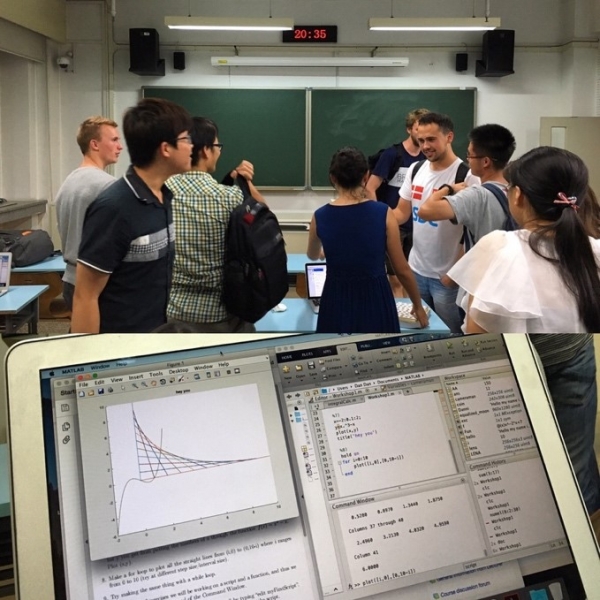
Some late-night MATLAB learning and hospital brain imaging analyses
2nd year of studies – but first some photos
Finally, the third and fourth semester were both assigned to our Master’s thesis project. However, before I go on talking about this, I want share a few memorable moments outside the classroom that I gained during the first year of my studies. I do think that these experiences, in addition to the education, were really important to acquire a more refined and unbiased understanding of the Chinese culture, the people, and the country as a whole.
Here we are at our first “Arne’s bathtub” which is a social event for all neuroscience students and teachers to get to know each other better. Basically, we all meet in our teacher, Arne’s hotel room with a lot of snacks and drinks

Participation in UCAS’ choir singing contests representing SDC. We were trained for several weeks up to the actual competition. I must say, this was a once in life-time experience for someone who grew up in Denmark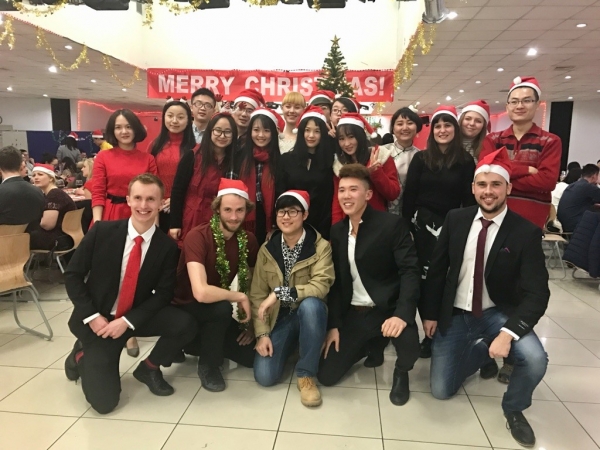
The neuro-students at the annual SDC Christmas party
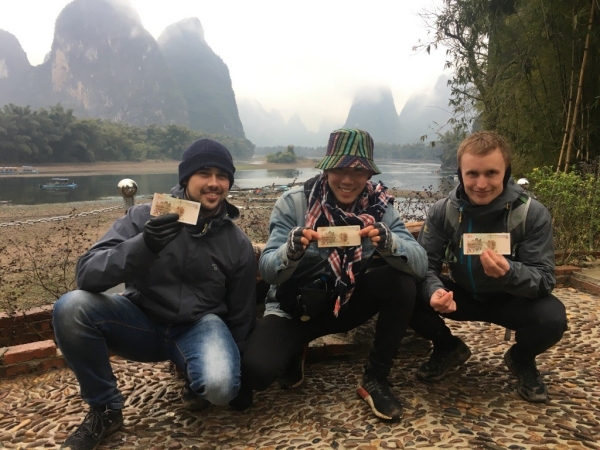
The beautiful scenery of Yangshuo, Guangxi – Travelling with my two good friends, Klaus and Patrick during the Spring holidays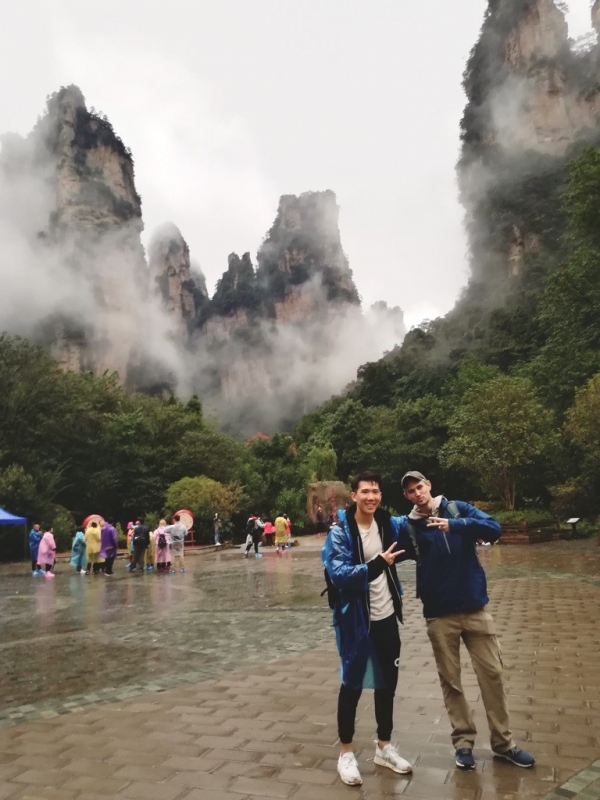
In Zhangjiajie together with one of my new best friends, Thomas from the Water and Environment program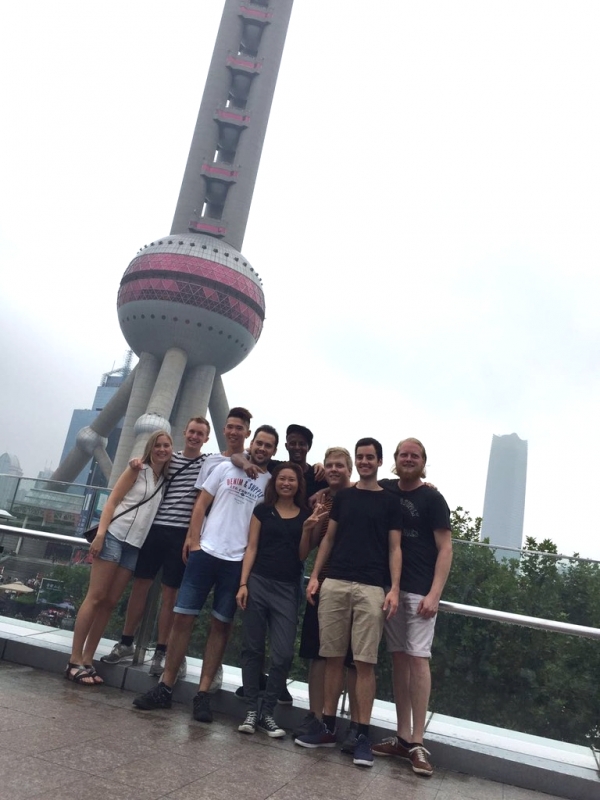
You can’t go to China without visiting the magnificent metropolis of Shanghai!
2nd year of studies – Master’s thesis project
Okay, so for the final year, I decided to bridge my Bachelor’s studies with my Master’s studies, by investigating “the neuroanatomical manifestations of food addiction” for my thesis project (it is now published in the peer-reviewed scientific journal Appetite; https://doi.org/10.1016/j.appet.2020.104850). During this time, I was mostly situated at the Key Laboratory of Mental Health, Institute of Psychology, Chinese Academy of Sciences under supervision of Professor Yonghui Li and Associate Professor Thomas Alrik Sørensen. However, in order to attain further expertise in Diffusion Tensor Imaging (a specified neuroimaging technique for neuroanatomical measurements), I had the privilege to stay at Southwest University, Chongqing for a month as a visiting student at Professor Qinghua He’s laboratory – and of course I also used the opportunity to eat a lot of delicious spicy Chongqing food!
In front of the laboratory at Southwest University (left) and at the biggest psychology conference in China held at the Southwest University (right)
Fast forward, after a year of hard work and a lot of sophisticated brain imaging analyses, but importantly also beyond great memories and fun experiences with all my new friends, I defended my thesis project in the Summer of 2018. Honestly speaking, this was a very bitter-sweet moment for me – sweet, because I finished my degree and is now a (hopefully) smarter person both in life and in school, but at the same time bitter, because I knew that this was “the end of an era” and unforgettable two years of my life, which I still miss today.
All in all, the Neuroscience and Neuroimaging program in SDC has really given me a tremendous time in China, as a Danish-Chinese student.
After defending my Master’s thesis in front of the old SDC teaching building in Zhongguancun – Left: with my mother and my supervisor Professor Yonghui Li. Right: with my friends Kristian, Sascha, and Thomas
PhD – A neuroscientific perspective of food-related consumer science
As many new graduates, I now faced numerous important decisions for my future. Where should I go? What do I want to do? Do I want to stay in academia or do I want to work in a private company? And etc…
Luckily, I had some sense of direction that I sought to follow. Firstly, I was absolutely not done with China and the experiences it would involve. Secondly, I was motivated to continue working with neuroscientific methods in a food perspective, in order to strategically be capable of employing my competences in both a commercial and academic context within the continuum of the food and brain domain. So, what better way to fulfill these aspirations than pursuing a PhD position in the new SDC Food and Health research area in collaboration with the Neuroscience and Neuroimaging program.
Of course, it was not an easy process to get this, and a lot of communication and research was required. In fact, I had to spend three months as a research assistant at Aarhus University before initiating my PhD studies.
Nevertheless, with the financial support of SDC, I have now been affiliated to the Food Quality Perception & Society Team, iSENSE Lab at the Department of Food Science, Aarhus University and the Neuropsychology and Applied Cognitive Neuroscience Laboratory, Key Laboratory of Mental Health at the Institute of Psychology, Chinese Academy of Sciences under supervision of Assistant Professor Qian Janice Wang, Professor Derek V. Byrne, and Professor Raymond C. K. Chan since January 2019. In essence, the aim of the PhD project is to explore the underlying and subconscious mechanisms of music-evoked food choices across Danish and Chinese consumers via neurological and biometric measurements. Hence, I am now in the field of sensory and consumer neuroscience.
I am currently slightly more than half way through my PhD, and therefore I have already completed and published some of my research conducted in both China and Denmark. Of note, this experience has thus far been extremely different from the experience I had from my Master’s. As a PhD student you do not follow a class and do not have everyday classmates whom you can talk to, which makes your studies much more independent. Yet, through this independency, I believe I have acquired various other more transferable skills that are not directly related to the science of my project, but still crucial for an optimal PhD delivery and future career opportunities. These includes skills such as project management, networking, and public speaking. I must say I am very grateful for this unique opportunity of working in this cross field between neuroscience and food science in Denmark and in China.
Conclusively, I will end this blog by saying many thanks to all the people I have met who have made my time in China beyond interesting. Especially thanks to my former and current supervisors who have supported me throughout the studies, during both “hills and valleys” and also thanks to the SDC staff who has made it possible for me to gain all these experiences, memories and not least amazing friends – much appreciated! I hope and strongly believe that the last half of my PhD will be just as fruitful as my previous years at SDC in terms of both professional advancement and personal development.
After returning to China for the first time as a PhD student. The picture taken in front of the main gate of Institute of Psychology, Chinese Academy of Sciences